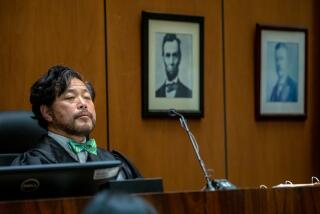Unsealing of Arrest Reports Ordered : Courts: Ruling is first to counter new countywide policy of denying access to police data filed in court.
- Share via
In the first test of the new countywide practice of sealing all police reports contained in Municipal Court files, a judge Tuesday ordered reports unsealed in one highly publicized criminal case.
Santa Monica Municipal Presiding Judge Laurence Rubin set Nov. 30 for the release of confidential arrest reports in the beating and robbery of veteran ABC correspondent Gary Shepard, allowing defense attorneys several days to seek a stay.
Rubin said, however, that he will first excise the addresses and telephone numbers of witnesses involved in the case to preclude their being harassed.
Shepard, 53, was attacked Nov. 2 in his home in the hills above Malibu. Five men have been arrested in connection with the incident. Reporters were denied routine access to police reports on the case. The information they wanted had been sealed in a plain brown envelope marked “confidential records.”
The Times obtained copies of the police reports from another source. They indicate that Shepard was not the random victim of a roving band of marauding transients, as first believed, but that he had invited one of the attackers into his home and, on a return visit, the guest brought along some friends to loot the isolated house.
While Tuesday’s ruling technically applies only to the Shepard case, it is seen as important to municipal courts throughout Los Angeles County as they attempt to balance witnesses’ right to privacy with the public’s right to know.
Times attorney Glen A. Smith said that if the courts do not reverse their position in light of Rubin’s ruling, media lawyers will seek a Superior Court order requiring them to do so, rather than continue to challenge the policy on a case-by-case basis.
Court files, including detailed arrest and crime reports, have long been open for inspection, and often provide reporters with their first overview of a developing criminal case--the suspect’s earliest statements about the crime and police findings at the crime scene. Without them, the public would learn only what authorities want it to know about police actions and crimes.
That openness vanished suddenly but quietly last spring. Relying on a section of the penal code that prohibits defense attorneys from disclosing victims’ or witnesses’ addresses or telephone numbers to the criminal defendants they represent, the county counsel’s office in April issued an opinion interpreting the section to mean that the court must restrict access to any documents in the files that contain such personal information.
All 24 Municipal Court judicial districts within Los Angeles County are affected by the new policy, which did not come to light until the Shepard case broke and generated wide interest.
Lawyers representing The Times and The Outlook newspapers argued before Rubin Tuesday that such a blanket ban--which covers not only arrest reports but also suspects’ criminal records, probation reports, search warrants and return affidavits, subpoenas, grand jury transcripts and other documents--is both unconstitutional and a misinterpretation of state law.
Defense attorneys argued that the Shepard case reports should stay sealed, primarily because they contain inadmissible confessions, and their release would make it difficult to impanel a fair jury.
Deputy Public Defender Tom Burns also asked the judge to issue a gag order preventing attorneys from even discussing the case with the media, a request Rubin denied.
The two-hour hearing took place in a tiny, nearly empty courtroom, an unlikely setting for a challenge with such far-reaching implications. It was dry and erudite, until defense attorney Joel Isaacson, threw up his hands, asking, “Just what does the public need to know? What are they going to gain by knowing all that?”
Rubin chuckled. “I suspect that people like Saddam Hussein use that argument all the time. That’s the dictator’s rejoinder. . . . Minutes later, he ordered the arrest report unsealed.
More to Read
Sign up for Essential California
The most important California stories and recommendations in your inbox every morning.
You may occasionally receive promotional content from the Los Angeles Times.










